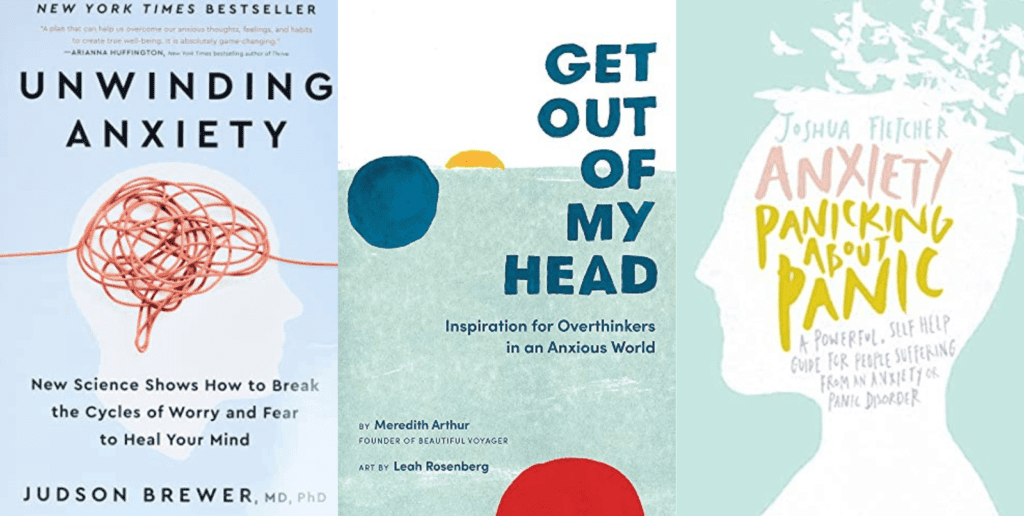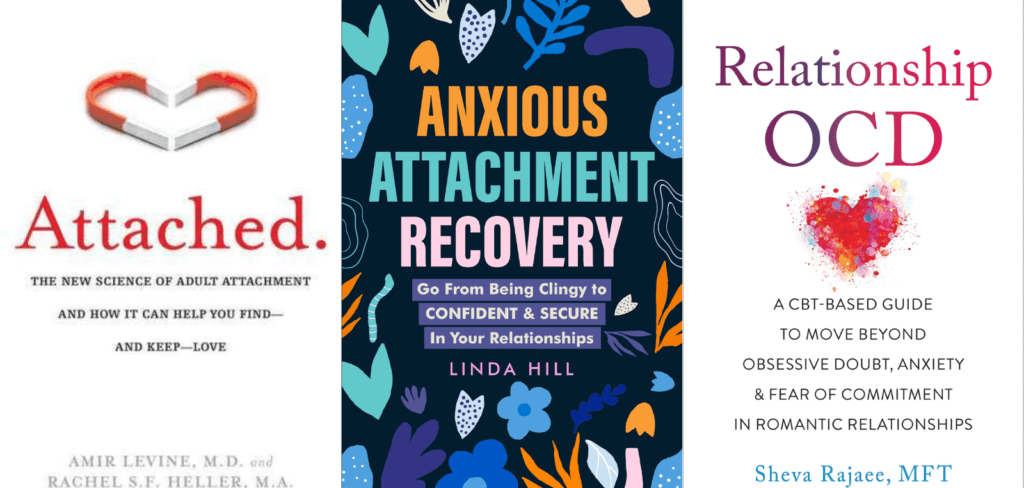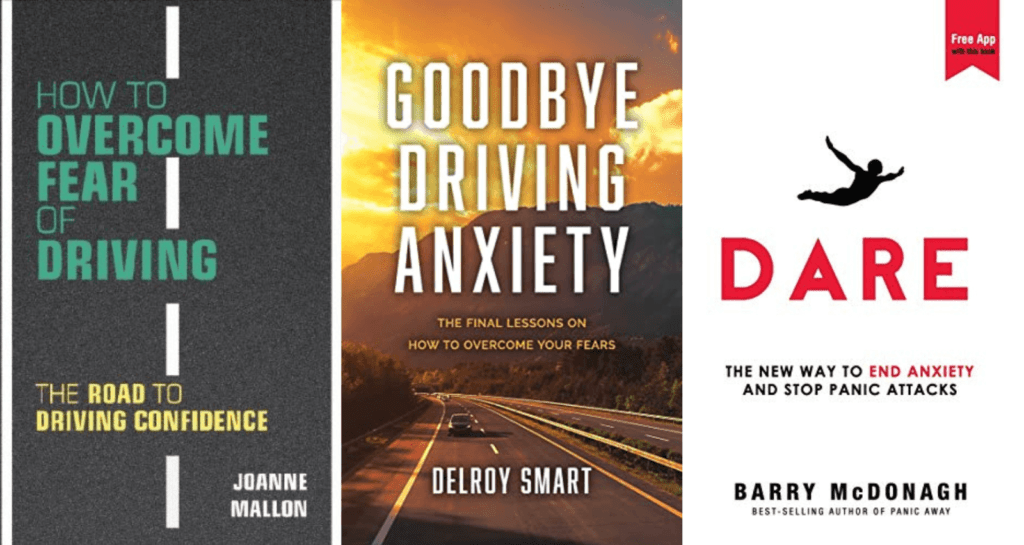The following are some of the best books about perfectionism to help you embark on your recovery journey.
Disclosure: Some of the links below are affiliate links. This means that, at zero cost to you, I will earn an affiliate commission if you click through the link and finalize a purchase.
Best Books For Overthinking And Anxiety
Related: Journal Prompts For Anxiety (+FREE Anxiety Worksheets)

1. Rewire Your Anxious Brain
By Catherine M. Pittman PhD, Elizabeth M. Karle MLIS
In the book, Pittman and Karle make it simple by offering specific examples of how to manage fear by tapping into both of these pathways in the brain. As you read, you’ll gain a greater understanding how anxiety is created in the brain, and as a result, you will feel empowered and motivated to overcome it. The brain is a powerful tool, and the more you work to change the way you respond to fear, the more resilient you will become.
Using the practical self-assessments and proven-effective techniques in this book, you will learn to literally “rewire” the brain processes that lie at the root of your fears.
Related: Top 10 Practical CBT Exercises For Generalized Anxiety Disorder Relief

2. Stop Overthinking
By Nick Trenton
Stop Overthinking is a book that understands where you’ve been through,the exhausting situation you’ve put yourself into, and how you lose your mind in the trap of anxiety and stress.
Acclaimed author Nick Trenton will walk you through the obstacles with detailed and proven techniques to help you rewire your brain, control your thoughts, and change your mental habits.What’s more, the book will provide you scientific approaches to completely change the way you think and feel about yourself by ending the vicious thought patterns.
Related: 30 Day Social Anxiety Challenge That Will Help You Feel More Confident

3. The Anxiety and Phobia Workbook
By Edmund J Bourne PhD
Packed with the most effective skills for assessing and treating anxiety, this evidence-based workbook contains the latest clinical research. You’ll find an arsenal of tools for quieting worry, ending negative self-talk, and taking charge of your anxious thoughts, including:
- Relaxation and breathing techniques
- New research on exposure therapy for phobias
- Lifestyle, exercise, mindfulness and nutrition tips
Related: High Functioning Anxiety Test (& How To Support Anxiety Recovery)

4. Anxiety: Panicking about Panic
By Joshua Fletcher
The book acts as an informative guide and draws from the experiences of author and counsellor, Joshua Fletcher, who lived with anxiety disorder for years before successfully overcoming the condition.
The book is tailored for people who are: experiencing panic attacks, feeling abnormally anxious, ruminating about health, anticipating further panic attacks and questioning why anxiety is present in the first place.
Related: How To Stop Self-Critical Thoughts Using These Top 10 Techniques

5. Dare
By Barry McDonagh
Based on hard science and over 10 years helping people who suffer from anxiety, Barry McDonagh shares his most effective technique in this new book.The DARE technique can be used by everyone, regardless of age or background, to live a life free from anxiety or panic attacks.In this step-by-step guide you will discover how to:
- Stop panic attacks and end feelings of general anxiety.
- Face any anxious situation you’ve been avoiding (driving/flying/shopping etc.).
- Put an end to anxious or intrusive thoughts.
- Use the CORRECT natural supplements to relieve anxiety.
- Boost your confidence and feel like your old self again.
- Fall asleep faster and with less anxiety each night.
- Live a more bold and adventurous life again.
Related: What Causes Cognitive Distortions? (+Top 10 Common Cognitive Distortions & How To Challenge Them)

6. Unwinding Anxiety
By Judson Brewer
Distilling more than 20 years of research and hands-on work with thousands of patients, including Olympic athletes and coaches, and leaders in government and business, Dr. Brewer has created a clear, solution-oriented program that anyone can use to feel better – no matter how anxious they feel.
Related: How To Overcome Agoraphobia Without Medication? 9-Step Guide To Control Panic Attack In Public

7. Get Out of My Head
By Meredith Arthur
Written by Meredith Arthur, founder of the popular mental health platform Beautiful Voyager, and illustrated by Leah Rosenberg, this charming alternative to technical mental health guides walks readers through the process of building awareness around anxiety, identifying triggers, moving through blocks, building healthy boundaries, and developing an arsenal of tools for thriving. With actionable tips throughout, and a special section on dealing with end-of-year anxieties, this striking volume also includes a small, saddle-stitched secondary book — meant to act like a weighted blanket in book form for help on the go — in a concealed internal pocket.
Related: Best 10 Intrusive Thoughts Books

8. The Anxiety and Worry Workbook
By David A. Clark, Aaron T. Beck
Dr. Beck and fellow cognitive therapy expert David A. Clark put the tools and techniques of cognitive behavior therapy at your fingertips in this compassionate guide. Carefully crafted worksheets (you can download and print additional copies as needed), exercises, and examples reflect the authors’ decades of experience helping people just like you. Learn practical strategies for identifying your anxiety triggers, challenging the thoughts and beliefs that lead to distress, safely facing the situations you fear, and truly loosening anxiety’s grip–one manageable step at a time.
Related: Best 10 Books For Social Anxiety

9. The Anatomy of Anxiety
By Ellen Vora
In The Anatomy of Anxiety, holistic psychiatrist Dr. Ellen Vora offers nothing less than a paradigm shift in our understanding of anxiety and mental health, suggesting that anxiety is not simply a brain disorder but a whole-body condition.
Practical, informative, and deeply hopeful, The Anatomy of Anxiety is the first book to fully explain the origins of anxiety and offer a detailed road map for healing and growth.
Related: Journal Prompts For Anxiety (+FREE Anxiety Worksheets)

10. The Anxiety Healer’s Guide
By Alison Seponara MS LPC
Alison Seponara brings her expertise and commitment to healing anxiety to the world. While the journey toward recovery might look different for everyone, this portable resource is full of concrete activities, tools, and techniques that have been scientifically proven to calm the sympathetic (fight-or-flight) nervous system and give sufferers a better sense of control over their minds and bodies.

How Books For Overthinking And Anxiety Can Help?
Books on overthinking and anxiety can be a valuable resource in helping you manage these challenges. Here are some ways in which they can be beneficial:
1. Education and Understanding
Books provide information about the nature of overthinking and anxiety, including their causes, symptoms, and underlying mechanisms.
By understanding the science behind these experiences, you can gain insights into why you think and feel the way you do.
This understanding can help normalize your experiences and reduce self-judgment.
2. Cognitive Restructuring
Many books offer cognitive-behavioral strategies that can help you reframe negative thought patterns and challenge irrational thinking associated with overthinking and anxiety.
They may provide practical exercises to identify and replace unhelpful thoughts with more realistic and positive ones.
These techniques can empower you to regain control over your thoughts and reduce anxiety.
3. Mindfulness and Relaxation Techniques
Books often introduce mindfulness and relaxation practices as effective tools for managing overthinking and anxiety.
They may provide step-by-step instructions on various techniques such as meditation, deep breathing, and progressive muscle relaxation.
Regular practice of these techniques can help calm your mind and reduce anxiety symptoms.
4. Self-Help Strategies
Books may offer a range of self-help strategies to manage overthinking and anxiety, such as journaling, time management, physical exercise, and lifestyle adjustments.
They may also include guidance on building resilience, boosting self-esteem, and improving self-care practices.
Implementing these strategies can contribute to a sense of empowerment and improved well-being.
5. Personal Stories and Reflections
Many books include personal stories and reflections from individuals who have struggled with overthinking and anxiety.
Reading about others’ experiences can help you feel less alone and provide inspiration and motivation for your own journey toward managing these challenges.
Conclusion
While books can provide valuable guidance and tools, it’s important to remember that they are not a substitute for professional help.



